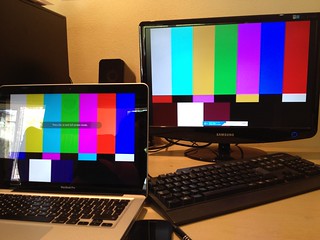Legacy nvidia hardware not supported
The nvidia "unified" driver unfortunately doesn't have support for "legacy" nvidia hardware. In this case, with some luck, Xorg will default to the nouveau driver. I would be ideal if someone could confirm their old legacy nvidia hardware does indeed correctly fall back to the nouveau driver, because I can't test this.
It's not reasonable for Webconverger developers to support proprietary acceleration on "legacy" nvidia cards since:
- I don't have any such hardware to develop with
- New Xorg 1.12 have a new API, which the legacy drivers will not be ported to
You can tell if your nvidia is considered a legacy device by looking up the ids on: https://github.com/Webconverger/webc/tree/master/usr/share/nvidia
nvidia sanity testing on linux
These files should be in use:
/dev/nvidia0
/usr/lib/libnvidia-glcore.so.302.17
/usr/lib/nvidia/current/libGL.so.302.17
/usr/lib/nvidia/current/libglx.so.302.17
/usr/lib/nvidia/current/nvidia_drv.so
/usr/lib/nvidia/diversions/libglx.so
/usr/lib/tls/libnvidia-tls.so.302.17
http://static.dabase.com/fps is a simple WebGL FPS test
Hardware setups
- Plugged directly into nvidia card - rare on desktop kiosk deployments, should not happen on laptops equipped with nvidia acceleration in "optimus" setups
- Optimus type setups, display connected by VGA and not directly into nvidia card
Currently from 14.1 only case 2 is supported.
Typical issues:
- https://github.com/Webconverger/webc/issues/67
- Issue covering case 1 https://github.com/Webconverger/webc/issues/76
nVidia integration guide
There are two parts to integrating the proprietary nvidia driver:
- the nvidia kernel
- the matching nvidia driver component
Setting up the development environment on the target machine
To update the drivers, it's best to work from a live chroot on the target
machine, so boot into debug mode and mount -o remount /tmp in order to remove
the "noexec" security flag.
# apt-get update
# mkdir -p /var/cache/apt/archives/ /var/lib/dpkg/info
# apt-get install linux-headers-3.2.0-2-artax1-486 build-essential
Despite the numerous apt complaints, the files are installed. It's just that
all the /var/lib/dpkg/info listings have been removed in a
commit
to save space.
Taking screenshots are pretty useful. I recommend apt-get install scrot dmenu
and then taking a screen shot by using alt+p keystroke and typing scrot
/tmp/a-clever-name.png.
Next you need to download the latest nvidia driver package from their ftp site: ftp://download.nvidia.com/XFree86/Linux-x86/
I usually copy the link and wget it into /tmp. This version should be later
than modinfo nvidia | grep version:, else you are probably wasting your time.
/tmp# sh ./NVIDIA*.run -x
Building the nvidia kernel module
Using the Archlinux nvidia packaging as a guide.
/tmp/NVIDIA-whatever/kernel# make module
/tmp/NVIDIA-whatever/kernel# make install
The install should simply move the nvidia.ko to the right place in /lib/modules/blah-blah/kernel/drivers/video/nvidia.ko as the original commit did.
/tmp/NVIDIA-whatever/kernel# git status
To double check that there is a modified: ..../nvidia.ko line
Installing the matching nvidia driver component
Using
nvidia-installer.log
as a guide to running ./nvidia-installer, install the accompanying drivers. Keep to the defaults with the dialog prompts.
Now pkill X and X will fail to restart. Go to another tty like ctrl+alt+f3
and login as root to gain a shell. Now rmmod nvidia should now cause the
system to insert the replacement nvidia.ko and X should just boot up again.
Confirm this is indeed the case with modinfo nvidia | grep version:
Dealing with Adobe issues
As the discussion documents, you might notice adobe flash with:
- Blue instead of yellow colours aka the smurf bug
- Instabilities
The solution is to patch VDPAU or look at the wonderful Archlinux wiki on browser plugins
The fix is introduced in https://github.com/Webconverger/webc/commit/9eba0e05b1dc900a90b997ae4a25e68f5f02f499 for example.
Contributing back
Since the rootfs is under git, you can
can create a commit carefully by only adding files relevant to your change and
then run git format-patch origin to create a encapsulated patch. To send the
patch to developers at Webconverger I recommend uploading it to your Web space
and providing a URL to it and posting to
webc-users about it.
Remember your contribution must be MIT licensed. Thank you!


